PSY2305: Five Factor Model of Personality and Employee Behavior
VerifiedAdded on 2023/06/04
|6
|1458
|274
Report
AI Summary
This report delves into the Five Factor Model (FFM) of personality, exploring its significance in understanding employee behavior within organizational settings. The assignment examines the FFM's five major domains—openness, conscientiousness, extraversion, agreeableness, and neuroticism—and emphasizes the importance of considering the model's facets for a more nuanced understanding of individual differences. The report analyzes how specific facets of the FFM, such as competence, dutifulness, and assertiveness, relate to organizational citizenship behaviors, workplace deviance, and unethical practices. It highlights the article "Utilizing Five Factor Model facets to conceptualize counterproductive, unethical, and organizational citizenship workplace behaviors" by Helle et al. (2018) which suggests that assessing personality traits, particularly at the facet level, can significantly aid in employee selection and predict workplace performance. The report also discusses the use of surveys and statistical analysis to support the relationship between FFM facets and workplace behaviors, concluding that a detailed understanding of personality traits is crucial for fostering a positive and productive work environment. The report also provides the references that are used in the study.
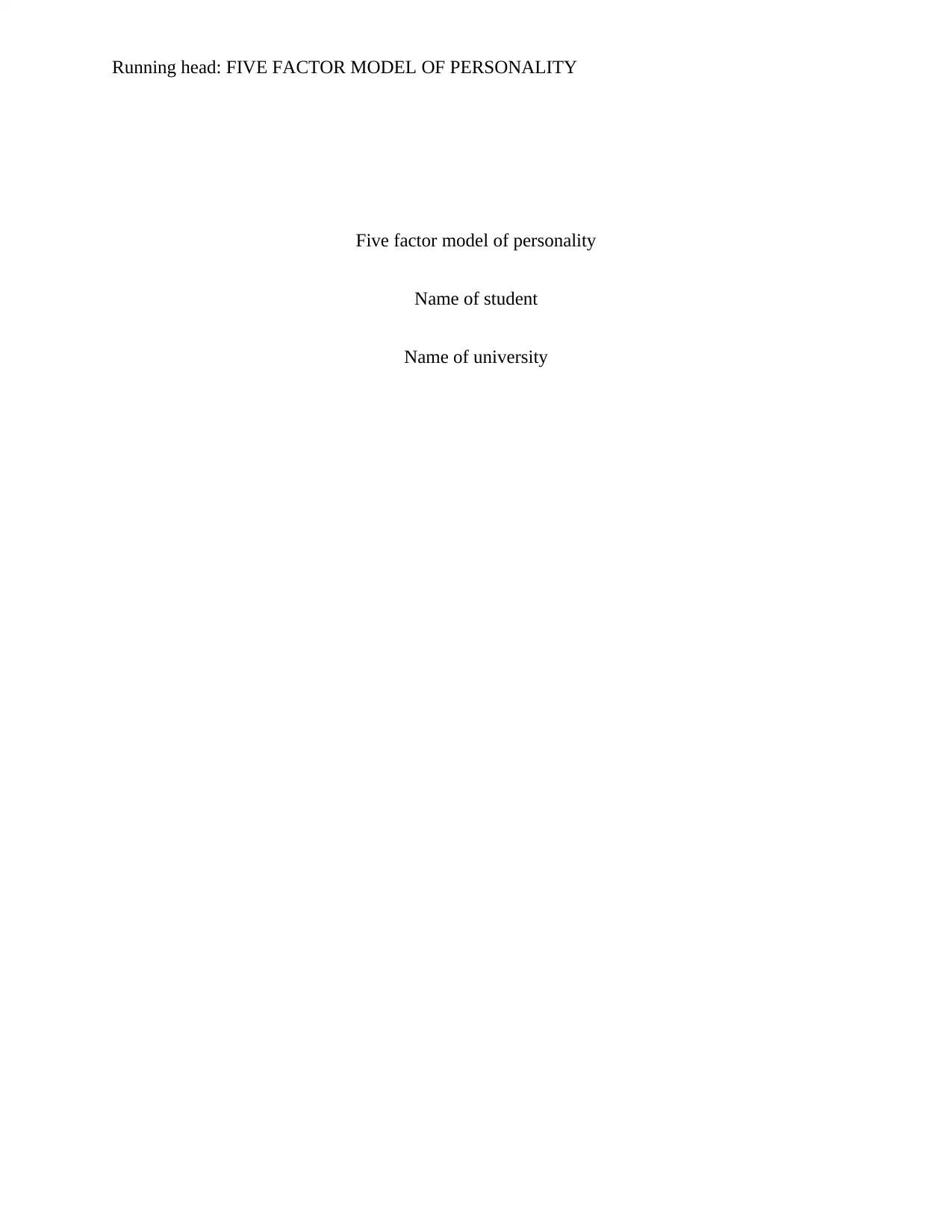
Running head: FIVE FACTOR MODEL OF PERSONALITY
Five factor model of personality
Name of student
Name of university
Five factor model of personality
Name of student
Name of university
Paraphrase This Document
Need a fresh take? Get an instant paraphrase of this document with our AI Paraphraser
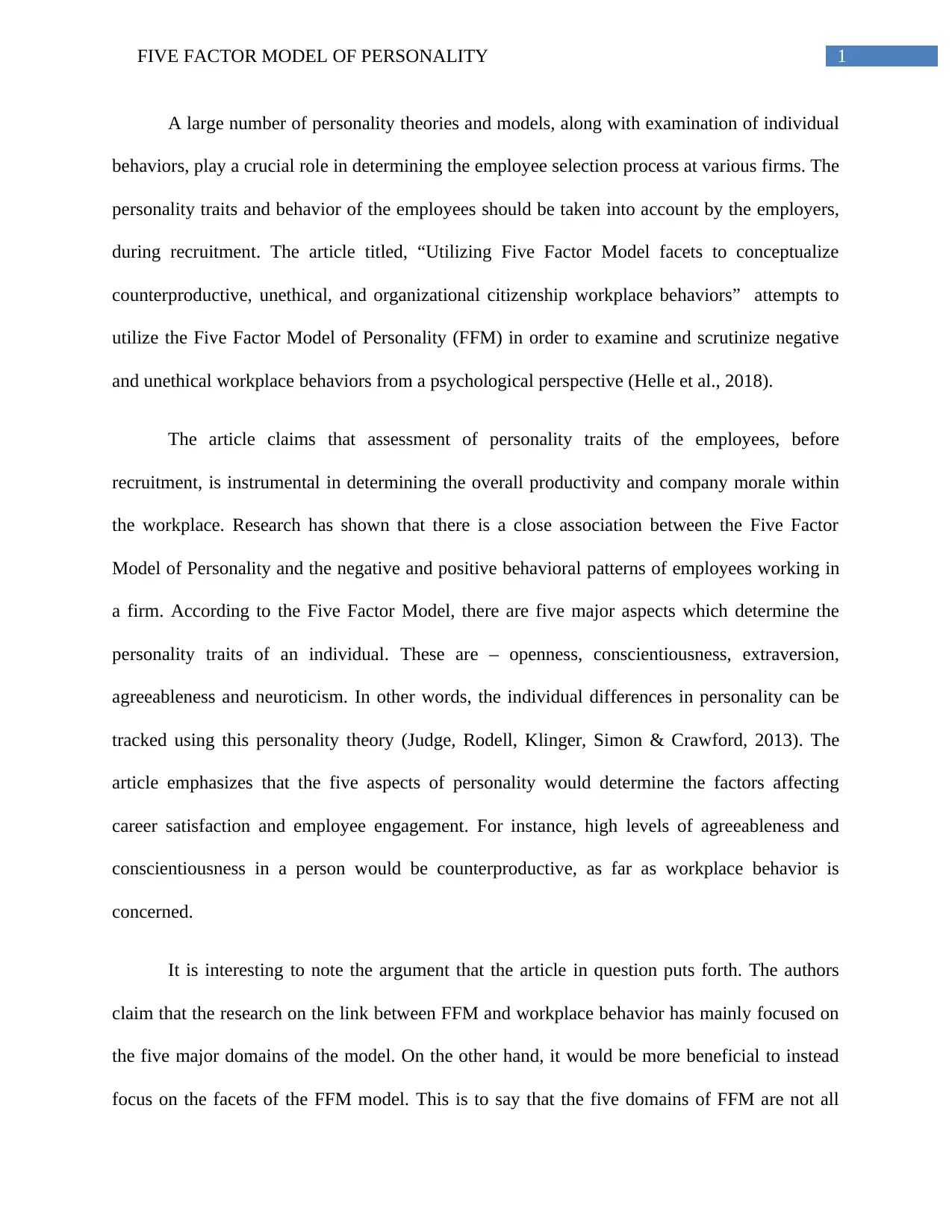
1FIVE FACTOR MODEL OF PERSONALITY
A large number of personality theories and models, along with examination of individual
behaviors, play a crucial role in determining the employee selection process at various firms. The
personality traits and behavior of the employees should be taken into account by the employers,
during recruitment. The article titled, “Utilizing Five Factor Model facets to conceptualize
counterproductive, unethical, and organizational citizenship workplace behaviors” attempts to
utilize the Five Factor Model of Personality (FFM) in order to examine and scrutinize negative
and unethical workplace behaviors from a psychological perspective (Helle et al., 2018).
The article claims that assessment of personality traits of the employees, before
recruitment, is instrumental in determining the overall productivity and company morale within
the workplace. Research has shown that there is a close association between the Five Factor
Model of Personality and the negative and positive behavioral patterns of employees working in
a firm. According to the Five Factor Model, there are five major aspects which determine the
personality traits of an individual. These are – openness, conscientiousness, extraversion,
agreeableness and neuroticism. In other words, the individual differences in personality can be
tracked using this personality theory (Judge, Rodell, Klinger, Simon & Crawford, 2013). The
article emphasizes that the five aspects of personality would determine the factors affecting
career satisfaction and employee engagement. For instance, high levels of agreeableness and
conscientiousness in a person would be counterproductive, as far as workplace behavior is
concerned.
It is interesting to note the argument that the article in question puts forth. The authors
claim that the research on the link between FFM and workplace behavior has mainly focused on
the five major domains of the model. On the other hand, it would be more beneficial to instead
focus on the facets of the FFM model. This is to say that the five domains of FFM are not all
A large number of personality theories and models, along with examination of individual
behaviors, play a crucial role in determining the employee selection process at various firms. The
personality traits and behavior of the employees should be taken into account by the employers,
during recruitment. The article titled, “Utilizing Five Factor Model facets to conceptualize
counterproductive, unethical, and organizational citizenship workplace behaviors” attempts to
utilize the Five Factor Model of Personality (FFM) in order to examine and scrutinize negative
and unethical workplace behaviors from a psychological perspective (Helle et al., 2018).
The article claims that assessment of personality traits of the employees, before
recruitment, is instrumental in determining the overall productivity and company morale within
the workplace. Research has shown that there is a close association between the Five Factor
Model of Personality and the negative and positive behavioral patterns of employees working in
a firm. According to the Five Factor Model, there are five major aspects which determine the
personality traits of an individual. These are – openness, conscientiousness, extraversion,
agreeableness and neuroticism. In other words, the individual differences in personality can be
tracked using this personality theory (Judge, Rodell, Klinger, Simon & Crawford, 2013). The
article emphasizes that the five aspects of personality would determine the factors affecting
career satisfaction and employee engagement. For instance, high levels of agreeableness and
conscientiousness in a person would be counterproductive, as far as workplace behavior is
concerned.
It is interesting to note the argument that the article in question puts forth. The authors
claim that the research on the link between FFM and workplace behavior has mainly focused on
the five major domains of the model. On the other hand, it would be more beneficial to instead
focus on the facets of the FFM model. This is to say that the five domains of FFM are not all
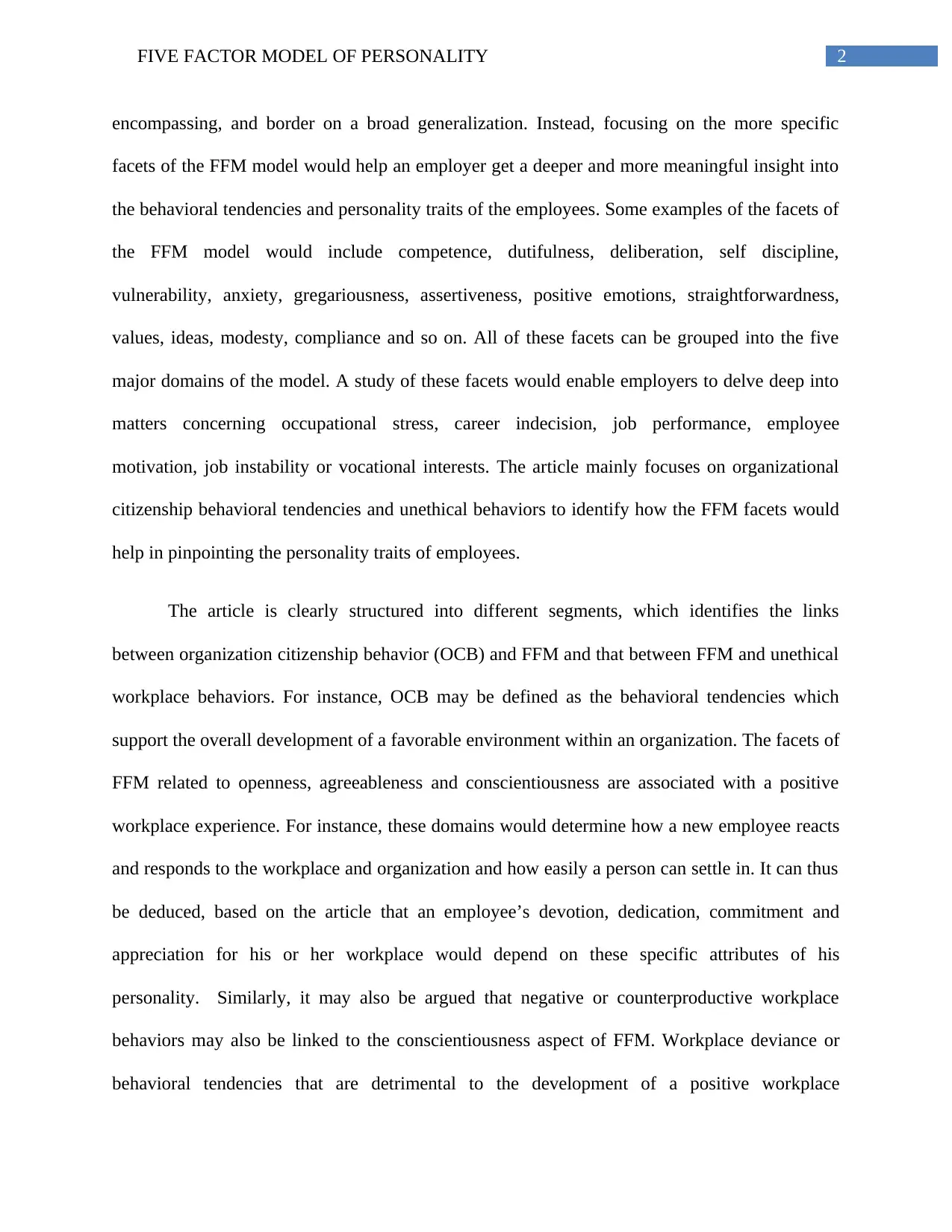
2FIVE FACTOR MODEL OF PERSONALITY
encompassing, and border on a broad generalization. Instead, focusing on the more specific
facets of the FFM model would help an employer get a deeper and more meaningful insight into
the behavioral tendencies and personality traits of the employees. Some examples of the facets of
the FFM model would include competence, dutifulness, deliberation, self discipline,
vulnerability, anxiety, gregariousness, assertiveness, positive emotions, straightforwardness,
values, ideas, modesty, compliance and so on. All of these facets can be grouped into the five
major domains of the model. A study of these facets would enable employers to delve deep into
matters concerning occupational stress, career indecision, job performance, employee
motivation, job instability or vocational interests. The article mainly focuses on organizational
citizenship behavioral tendencies and unethical behaviors to identify how the FFM facets would
help in pinpointing the personality traits of employees.
The article is clearly structured into different segments, which identifies the links
between organization citizenship behavior (OCB) and FFM and that between FFM and unethical
workplace behaviors. For instance, OCB may be defined as the behavioral tendencies which
support the overall development of a favorable environment within an organization. The facets of
FFM related to openness, agreeableness and conscientiousness are associated with a positive
workplace experience. For instance, these domains would determine how a new employee reacts
and responds to the workplace and organization and how easily a person can settle in. It can thus
be deduced, based on the article that an employee’s devotion, dedication, commitment and
appreciation for his or her workplace would depend on these specific attributes of his
personality. Similarly, it may also be argued that negative or counterproductive workplace
behaviors may also be linked to the conscientiousness aspect of FFM. Workplace deviance or
behavioral tendencies that are detrimental to the development of a positive workplace
encompassing, and border on a broad generalization. Instead, focusing on the more specific
facets of the FFM model would help an employer get a deeper and more meaningful insight into
the behavioral tendencies and personality traits of the employees. Some examples of the facets of
the FFM model would include competence, dutifulness, deliberation, self discipline,
vulnerability, anxiety, gregariousness, assertiveness, positive emotions, straightforwardness,
values, ideas, modesty, compliance and so on. All of these facets can be grouped into the five
major domains of the model. A study of these facets would enable employers to delve deep into
matters concerning occupational stress, career indecision, job performance, employee
motivation, job instability or vocational interests. The article mainly focuses on organizational
citizenship behavioral tendencies and unethical behaviors to identify how the FFM facets would
help in pinpointing the personality traits of employees.
The article is clearly structured into different segments, which identifies the links
between organization citizenship behavior (OCB) and FFM and that between FFM and unethical
workplace behaviors. For instance, OCB may be defined as the behavioral tendencies which
support the overall development of a favorable environment within an organization. The facets of
FFM related to openness, agreeableness and conscientiousness are associated with a positive
workplace experience. For instance, these domains would determine how a new employee reacts
and responds to the workplace and organization and how easily a person can settle in. It can thus
be deduced, based on the article that an employee’s devotion, dedication, commitment and
appreciation for his or her workplace would depend on these specific attributes of his
personality. Similarly, it may also be argued that negative or counterproductive workplace
behaviors may also be linked to the conscientiousness aspect of FFM. Workplace deviance or
behavioral tendencies that are detrimental to the development of a positive workplace
⊘ This is a preview!⊘
Do you want full access?
Subscribe today to unlock all pages.

Trusted by 1+ million students worldwide
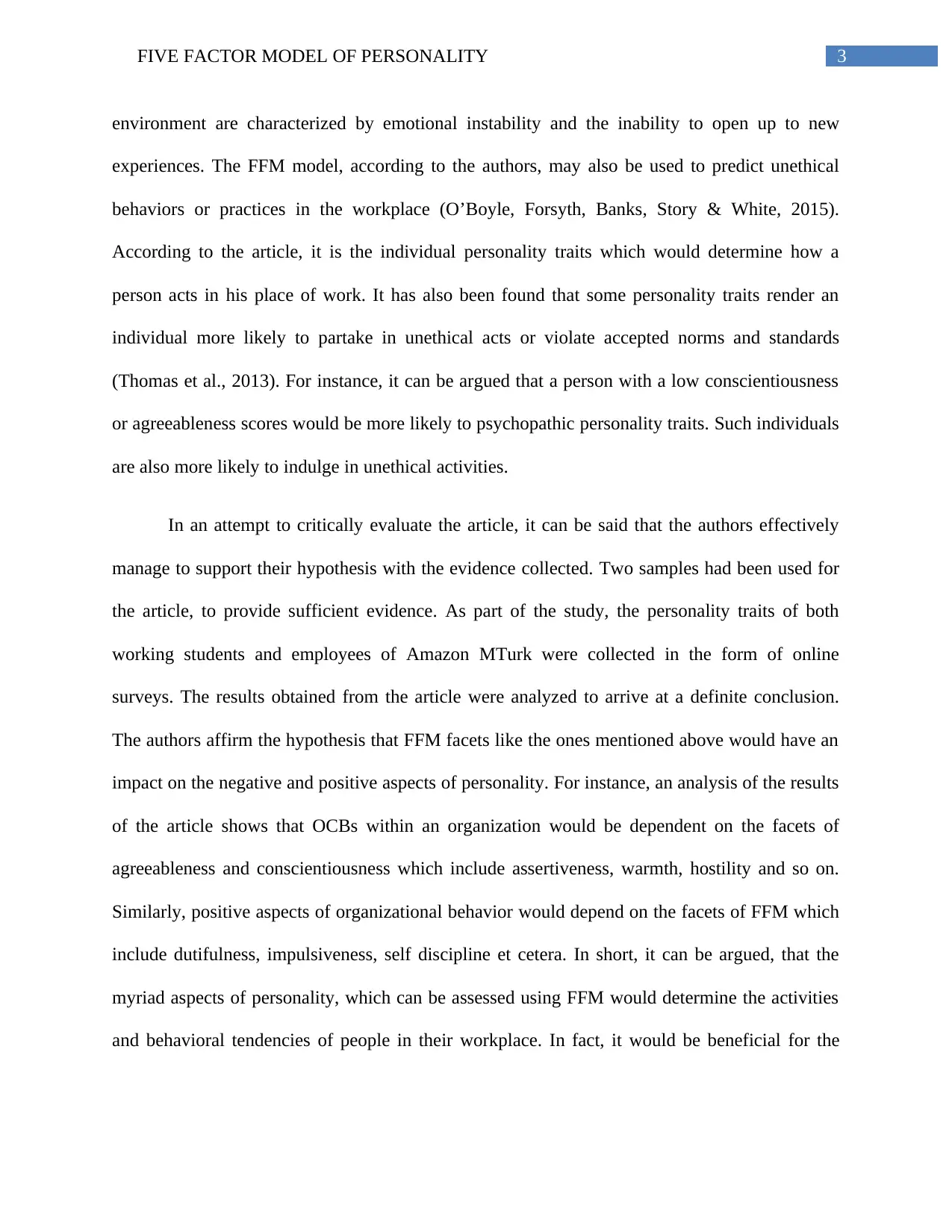
3FIVE FACTOR MODEL OF PERSONALITY
environment are characterized by emotional instability and the inability to open up to new
experiences. The FFM model, according to the authors, may also be used to predict unethical
behaviors or practices in the workplace (O’Boyle, Forsyth, Banks, Story & White, 2015).
According to the article, it is the individual personality traits which would determine how a
person acts in his place of work. It has also been found that some personality traits render an
individual more likely to partake in unethical acts or violate accepted norms and standards
(Thomas et al., 2013). For instance, it can be argued that a person with a low conscientiousness
or agreeableness scores would be more likely to psychopathic personality traits. Such individuals
are also more likely to indulge in unethical activities.
In an attempt to critically evaluate the article, it can be said that the authors effectively
manage to support their hypothesis with the evidence collected. Two samples had been used for
the article, to provide sufficient evidence. As part of the study, the personality traits of both
working students and employees of Amazon MTurk were collected in the form of online
surveys. The results obtained from the article were analyzed to arrive at a definite conclusion.
The authors affirm the hypothesis that FFM facets like the ones mentioned above would have an
impact on the negative and positive aspects of personality. For instance, an analysis of the results
of the article shows that OCBs within an organization would be dependent on the facets of
agreeableness and conscientiousness which include assertiveness, warmth, hostility and so on.
Similarly, positive aspects of organizational behavior would depend on the facets of FFM which
include dutifulness, impulsiveness, self discipline et cetera. In short, it can be argued, that the
myriad aspects of personality, which can be assessed using FFM would determine the activities
and behavioral tendencies of people in their workplace. In fact, it would be beneficial for the
environment are characterized by emotional instability and the inability to open up to new
experiences. The FFM model, according to the authors, may also be used to predict unethical
behaviors or practices in the workplace (O’Boyle, Forsyth, Banks, Story & White, 2015).
According to the article, it is the individual personality traits which would determine how a
person acts in his place of work. It has also been found that some personality traits render an
individual more likely to partake in unethical acts or violate accepted norms and standards
(Thomas et al., 2013). For instance, it can be argued that a person with a low conscientiousness
or agreeableness scores would be more likely to psychopathic personality traits. Such individuals
are also more likely to indulge in unethical activities.
In an attempt to critically evaluate the article, it can be said that the authors effectively
manage to support their hypothesis with the evidence collected. Two samples had been used for
the article, to provide sufficient evidence. As part of the study, the personality traits of both
working students and employees of Amazon MTurk were collected in the form of online
surveys. The results obtained from the article were analyzed to arrive at a definite conclusion.
The authors affirm the hypothesis that FFM facets like the ones mentioned above would have an
impact on the negative and positive aspects of personality. For instance, an analysis of the results
of the article shows that OCBs within an organization would be dependent on the facets of
agreeableness and conscientiousness which include assertiveness, warmth, hostility and so on.
Similarly, positive aspects of organizational behavior would depend on the facets of FFM which
include dutifulness, impulsiveness, self discipline et cetera. In short, it can be argued, that the
myriad aspects of personality, which can be assessed using FFM would determine the activities
and behavioral tendencies of people in their workplace. In fact, it would be beneficial for the
Paraphrase This Document
Need a fresh take? Get an instant paraphrase of this document with our AI Paraphraser
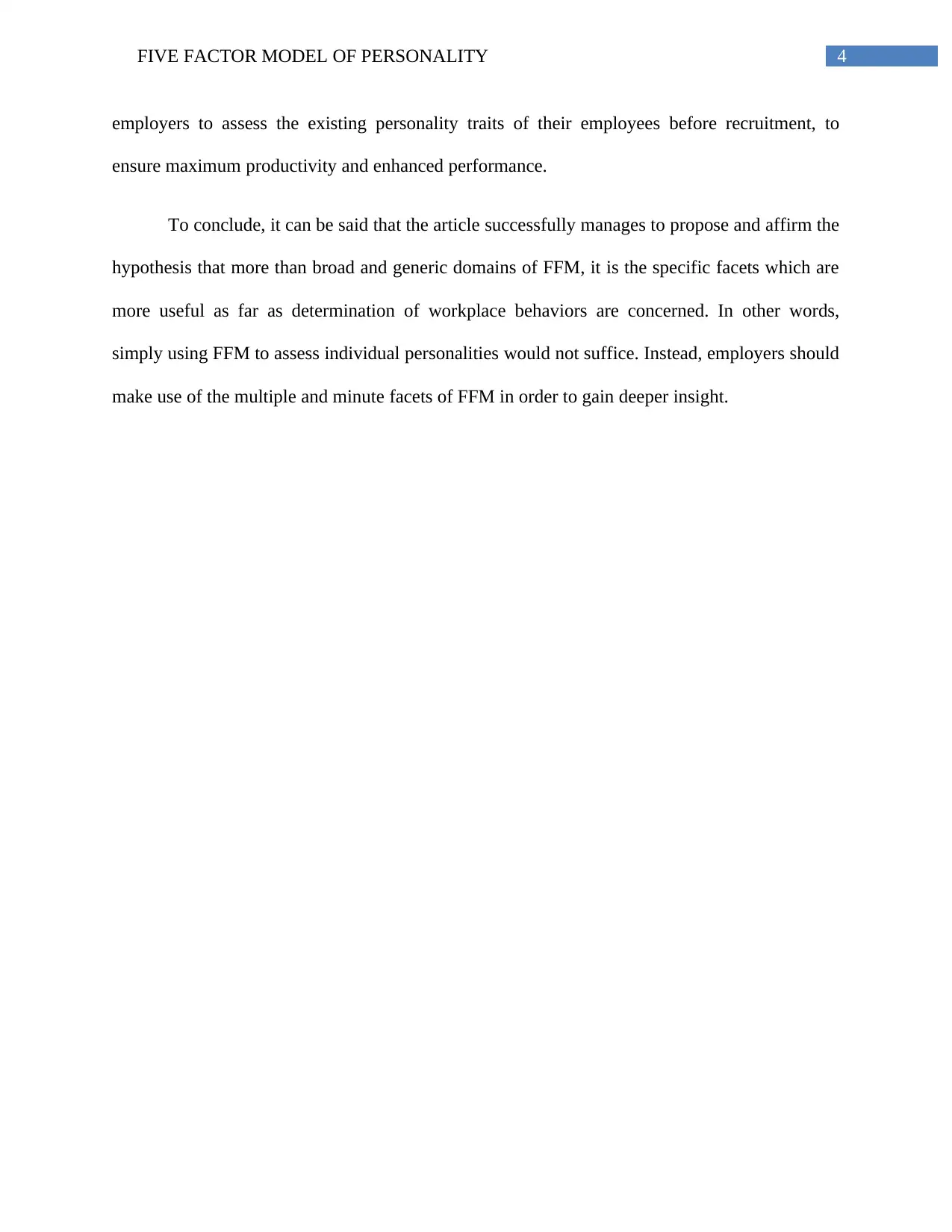
4FIVE FACTOR MODEL OF PERSONALITY
employers to assess the existing personality traits of their employees before recruitment, to
ensure maximum productivity and enhanced performance.
To conclude, it can be said that the article successfully manages to propose and affirm the
hypothesis that more than broad and generic domains of FFM, it is the specific facets which are
more useful as far as determination of workplace behaviors are concerned. In other words,
simply using FFM to assess individual personalities would not suffice. Instead, employers should
make use of the multiple and minute facets of FFM in order to gain deeper insight.
employers to assess the existing personality traits of their employees before recruitment, to
ensure maximum productivity and enhanced performance.
To conclude, it can be said that the article successfully manages to propose and affirm the
hypothesis that more than broad and generic domains of FFM, it is the specific facets which are
more useful as far as determination of workplace behaviors are concerned. In other words,
simply using FFM to assess individual personalities would not suffice. Instead, employers should
make use of the multiple and minute facets of FFM in order to gain deeper insight.
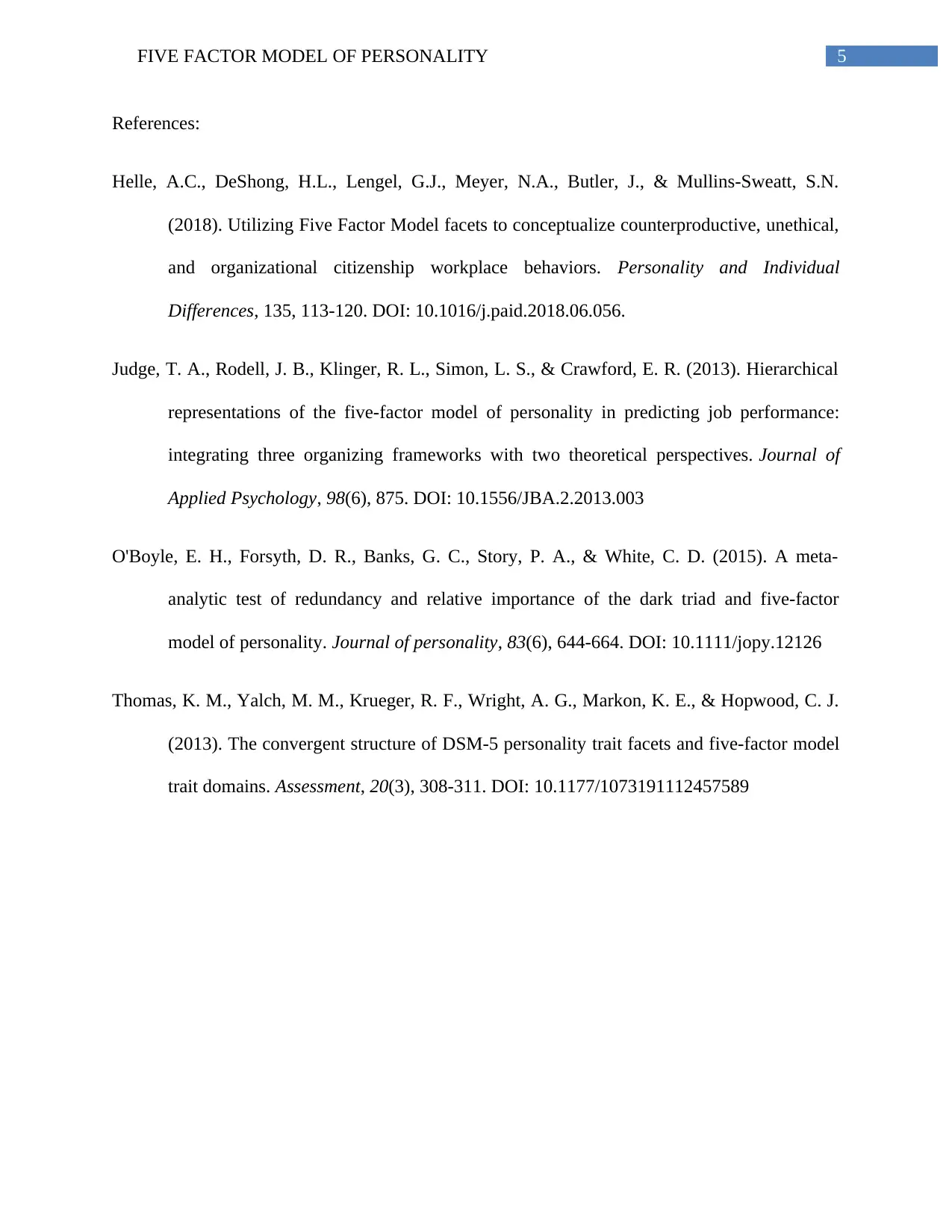
5FIVE FACTOR MODEL OF PERSONALITY
References:
Helle, A.C., DeShong, H.L., Lengel, G.J., Meyer, N.A., Butler, J., & Mullins-Sweatt, S.N.
(2018). Utilizing Five Factor Model facets to conceptualize counterproductive, unethical,
and organizational citizenship workplace behaviors. Personality and Individual
Differences, 135, 113-120. DOI: 10.1016/j.paid.2018.06.056.
Judge, T. A., Rodell, J. B., Klinger, R. L., Simon, L. S., & Crawford, E. R. (2013). Hierarchical
representations of the five-factor model of personality in predicting job performance:
integrating three organizing frameworks with two theoretical perspectives. Journal of
Applied Psychology, 98(6), 875. DOI: 10.1556/JBA.2.2013.003
O'Boyle, E. H., Forsyth, D. R., Banks, G. C., Story, P. A., & White, C. D. (2015). A meta‐
analytic test of redundancy and relative importance of the dark triad and five‐factor
model of personality. Journal of personality, 83(6), 644-664. DOI: 10.1111/jopy.12126
Thomas, K. M., Yalch, M. M., Krueger, R. F., Wright, A. G., Markon, K. E., & Hopwood, C. J.
(2013). The convergent structure of DSM-5 personality trait facets and five-factor model
trait domains. Assessment, 20(3), 308-311. DOI: 10.1177/1073191112457589
References:
Helle, A.C., DeShong, H.L., Lengel, G.J., Meyer, N.A., Butler, J., & Mullins-Sweatt, S.N.
(2018). Utilizing Five Factor Model facets to conceptualize counterproductive, unethical,
and organizational citizenship workplace behaviors. Personality and Individual
Differences, 135, 113-120. DOI: 10.1016/j.paid.2018.06.056.
Judge, T. A., Rodell, J. B., Klinger, R. L., Simon, L. S., & Crawford, E. R. (2013). Hierarchical
representations of the five-factor model of personality in predicting job performance:
integrating three organizing frameworks with two theoretical perspectives. Journal of
Applied Psychology, 98(6), 875. DOI: 10.1556/JBA.2.2013.003
O'Boyle, E. H., Forsyth, D. R., Banks, G. C., Story, P. A., & White, C. D. (2015). A meta‐
analytic test of redundancy and relative importance of the dark triad and five‐factor
model of personality. Journal of personality, 83(6), 644-664. DOI: 10.1111/jopy.12126
Thomas, K. M., Yalch, M. M., Krueger, R. F., Wright, A. G., Markon, K. E., & Hopwood, C. J.
(2013). The convergent structure of DSM-5 personality trait facets and five-factor model
trait domains. Assessment, 20(3), 308-311. DOI: 10.1177/1073191112457589
⊘ This is a preview!⊘
Do you want full access?
Subscribe today to unlock all pages.

Trusted by 1+ million students worldwide
1 out of 6
Related Documents
Your All-in-One AI-Powered Toolkit for Academic Success.
+13062052269
info@desklib.com
Available 24*7 on WhatsApp / Email
![[object Object]](/_next/static/media/star-bottom.7253800d.svg)
Unlock your academic potential
Copyright © 2020–2026 A2Z Services. All Rights Reserved. Developed and managed by ZUCOL.



